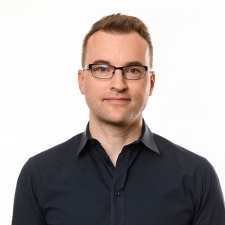Last year when we sat down with Improbable's Bill Roper at GDC 2018, we said that one way of judging the company's rise is the talent it has attracted.
The chief creative officer has since left, departing in February 2019 and returning to games development at Seattle's AuthorDigital. But once again, PCGamesInsider.biz was invited to sit down with Improbable's hot hire of the moment at GDC. This time, that's Aaryn Flynn, the BioWare vet who has been heading up the SpatialOS maker's new Edmonton outfit since September of last year.
Ahead of the San Francisco show, the $1bn cloud tech company announced that this Canadian office - along with a new team based in the firm's London home - was going to be developing its own games.
The Edmonton studio is now a 45-person strong outfit that features a variety of development vets, including former colleagues from BioWare. That figure is set to grow no bigger than "50 or 60", Flynn says.
"We got together and were really interested in doing something a bit different under a different set of terms," he explains.
"We'd met the Improbable folks - Rob, Herman and so on - and found we had a shared vision for what we want to accomplish. We appreciated the technology, the benefits of having an internal team really hammering the technology and trying things out. The phrase they use is dogfooding [Eat your own dogfood: companies using their own products as a means of testing and making them better]. At the same time, we got excited about the creative opportunities that existed. As we put it all together, we started to pitch other folks on that who might join us."

To the shock of no-one, Flynn and co are working on a new RPG. Though it's still early days, there are already concepts live internally using SpatialOS. With the studio's first project, it wants to push what is possible in the genre, while also getting back to what these kinds of games are about.
"We remain incredibly bullish about where RPGs can go and I think there's a surprising amount of opportunity there with SpatialOS and RPGs," Flynn says.
"We've often talked about this and said that our favourite RPGs are ones that really embrace empowerment - you can say what you want to say, go where you want to go, make the choices that you want to make and really get back to role-playing. That's fundamentally a question of empowerment. It's hard to role play if you can't choose or do anything. What can we do with SpatialOS that would get us back to role-playing, to really compelling experiences that allowed you to roleplay? That's become something of our laser focus as we think about these things."
We remain incredibly bullish about where RPGs can go and I think there's a surprising amount of opportunity there with SpatialOS and the genre
With new technology like SpatialOS, often times developers - especially first-party studios - get caught up in going as big and ambitious as possible. To pick an example that uses Improbable's tech, Cambridge based Automaton is looking to create a 1,000-person battle royale game in Mavericks: Proving Grounds where the standard at the moment is 100-players.
Flynn insists that the Edmonton studio isn't "chasing numbers" and is instead looking to see what tech like SpatialOS can bring to its RPG title.
"Scale is going to be a factor I think, but at the same time I'm not sure we're chasing numbers for the sake of numbers," he explains.
"That's a different kind of endeavour. I propose we flip that around; the best role-playing games have always offered intimacy and a certain amount of relationships, right? Can SpatialOS do that with a relatively small group of people? Yeah, I think it can and there are things that SpatialOS can help us build that help forge relationships between players in a deeper, more meaningful way. We don't have all the answers yet. We've got a lot of work to do. But we're trying to think of the challenge that way. If ultimately those things become strong enough that player counts can go up and we can get more and more interesting things at larger player numbers, I'm all for that. That's certainly compatible. But at the same time, we really want to make sure we're getting true, empowered relationships down and working well first before we contemplate the scale for scale's sake."
Despite being first-party - and thus ultimately there to show off what the SpatialOS tech can do - Flynn says that the Edmonton studio has a large degree of creative freedom.
"I certainly feel I have a lot of control. Herman and the team respect that usually these things work best when one person ultimately has the final decision in these things," he says.
"When we kicked this whole thing off, we knew what we were getting into using SpatialOS, believing that SpatialOS could be the differentiator for us - everybody in our team has bought into that. It comes down to the more day-to-day creative decisions we made. Herman and the team are nothing but supportive of that. We welcome their feedback and advice on things. They love this industry, they've played a lot of games, they have relationships and insights into things."

In addition to helping show off what's possible with the SpatialOS tech, the Edmonton studio is helping develop the Unreal Engine 4 Game Development Kit (GDK) for SpatialOS. This was announced at the end of last year.
"We contribute to that in two ways," he explains.
"One is we dog fooding it; we're using it right now. At the same time, some of our engineers are quite tightly coupled with that team in London. They're working together, collaborating on this and communicating. That's all part of the vision for this and why the benefit of first-party teams. The great thing about that, of course, is that we get some benefit for being close to the SpatialOS team, but at the same time, it's so critical that that benefit quickly and efficiently gets out to all our partners. If we're doing our jobs right, the Unreal GDK gets build faster and to a higher quality than if we didn't exist. That's because we're giving feedback on it, we're building it, we're co-developing, we're providing a very right use case for it with our game and so all those things should ultimately speed things up and keep us on the straight and narrow as we build that software."
Ultimately, the goal for Flynn and the Edmonton studio is twofold: create something that shows off SpatialOS, as well as being successful in its own right. This might be helped by the fact that RPG games are making a return.
"Roleplaying as a genre, I feel, is due for a renaissance," he says.
"So many folks have maybe softened the edges of roleplaying a bit too much. There are so many teams who are doing experiences, like Larian, and I look to them for inspiration. I'm asking myself: 'How can you do that in a multiplayer situation? What kinds of things can you do there?'. We talk about that a lot. At the end of the day, we just want a bunch of players to have some fun and to do something they haven't done before. From there comes the success and everything else you want in this industry."
This interview was done before the damning Kotaku article about BioWare and Anthem's development was published, which is why it is not brought up here - not that Flynn would have said much anyway













